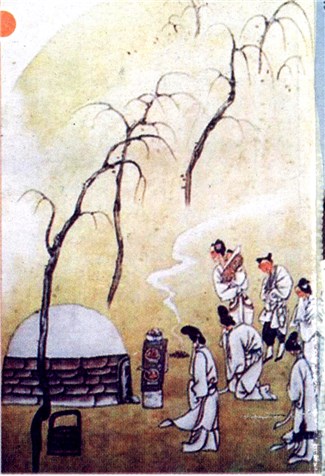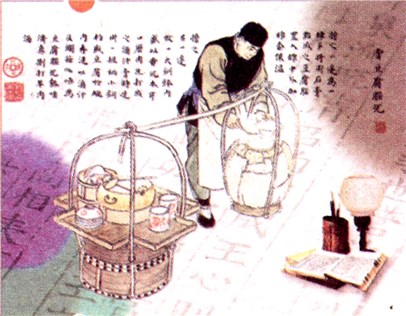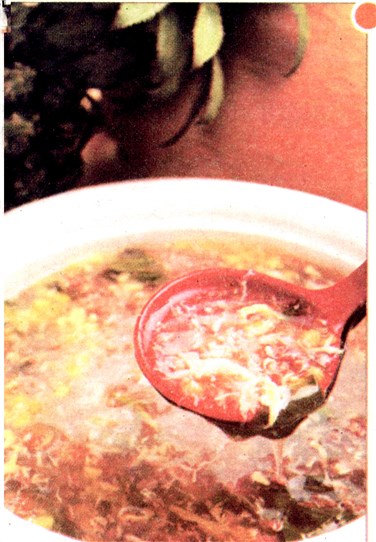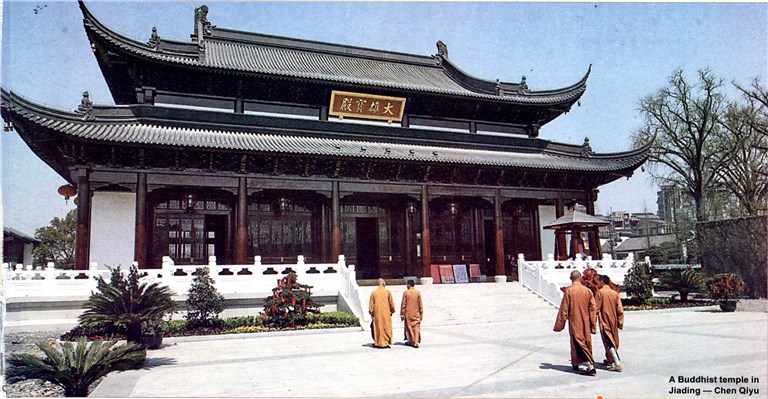

Search for the source of the custom in Jiading

lllustration of the Tomb-sweepingD〓

Burning Goushi Joss sticks is a tradition to commemorate Zhang shiche〓theleader of a farmer insurrectionary army at the end of the Yuan Dynast

lllustration of the story of a bean curd seller

Henian soup

A Buddhist temple in Jiading-Chen Qiyu
Pan Zheng
Located in the northwest of Shanghai,Jiading District enjoys a deep historical and cultural heritage,asmany historic sites and relics have been preserved here.Of all the different kinds of heritage,customs and traditions sometimes are even more treasured in people's daily lives.
In the early 1980s some cultural workers of Jiading District,who devoted themselves to protecting local customs and traditions,col-lected a group of folk stories about some Jiading-featured traditions.Those interesting stories are closely related to Jiading's folk custom and display the features of local folk arts.so this time,we pick some of thestories to share with you.
The lost tradition of tomb hanging
Jiang Rufeng and Pan Zheng
ON Tomb-sweeping Day(Qingming Festival)in the past,Jiading families used to hang bunches of paper looking like coins in differ-ent colors—white,pink,light blue—on the tombs of their anceStors.
At that time it was called“tomb hanging,”and the tradition lasted until private tombs gradually disappeared.
The tradition started in the age of Zhu YuanZhang,the first emperor of Ming Dynasty(1368—1644).Zhu was born into a poor family and became a monk in his childhood.His parents were buried with his neighbor's help after they passed away.Therefore,when Zhu ascended the throne,he decided to build a magnificent tomb for his parents.
However,Zhu was stumped when he triedto find the original tomb of his parents—he could not remember the scene very clearly as it had been too long since their burial.
Finally Zhu got an idea:if all the other people recognized their own tombs,the last one left would be his parents'.
Then,he used his imperial power and or-dered all the people to put some marks on their own family tombs before the Tomb-sweeping Day.Anyone who disobeyed the order would be punished with crime of being unfilial.
The imperial edict was issued and the com-mon people hurried to hang bunches of paper coins on their tombs.Zhu eventually found his parents'tomb,but the common people didn't know his true motive and still hung those markS every year,which gradually became a Tomb-sweeping Day tradition.
The lost tradition of burning Goushi joss sticks
Qian Naizhi and Pan Zheng
EACH year on the 30th night of the seventh lunar month in ancient times,families in Nanxiang Town,Jiading District would burn joss sticks,which was called Dizang Joss Stick or Goushi Joss Stick,in their courtyards.But nowadays,this tradition is no longer followed.
GouShi has a similar pronunciation to Jiusi—the nickname of Zhang Shicheng,the leader of a farmer insurrectionary army at the end of the Yuan Dynasty(1271—1368).Actually,burning Goushi Joss Sticks is a way to commemorate him.
Zhang was a native of Baijuchang Town in Taizhou City,Jiangsu Province,and worked as a salt dealer.In 1353,he could no longer stand the oppressing officials and landlords and inspired a revolution.Since he was kindand often helped others,many salt workers supported him and his army soon occupied Taizhou,Xinghua and Gaoyou.
Gradually,Zhang occupied Jiangsu and Zhejiang provinces and claimed himself“King of Wu.”Wherever Zhang reached,local people could live a safe and happy life.He was favored a lot by the residents on his land.
However,Zhang was defeated by Xu Da and Chang Yuchun,generals of Zhu Yuan-zhang,the first emperor of the Ming Dynasty(1368—1644).He was escorted to Nanjing and hanged himself on the 30th day of the seventh lunar month.
Nanxiang people,like those in many other places,used to benefit from Zhang and missed him a lot.Therefore,they figured out a way of burning Goushi Joss Sticks to commemorate him.
Fortune lies beneath the surface of Qianmen Pond
QIANMEN Pond is located in Waigang Town in the west of Jiading District.
It is said that a long time ago,there lived a good young man in the rural area who sold bean curd in town every day to earn a living.The strangest thing was that two customers visited his booth every day,but never paid.They usually sat down at his booth in the early morn- ing and had soybean milk,jellied bean curd and pot-stewed oil bean curd.After that,they would just leave without paying a penny.However,the young man never asked them to pay for the food,he even did not ask their names.Most people thought he was too tolerant.
One day,the two free riders felt ashamed of their conduct and asked the young man: “We come here every day and eat for free. Why don't you ask us to pay?”
The young man smiled and answered:“I know you two cannot afford it.Anyway,I can do business and I can still make a living,so it's okay.”
The two men then said:“It's too hard for you to make bean curd here and sell it in town.It will not make you rich.Maybe we will find you a place to open a new shop,and you will become a millionaire definitely.”However,the young man refused gently.
Some days later,the two men returned and invited the young man to visit their home.He followed them to the east,and eventually entered a reed marsh of Jiading.
The young man felt a strange sensation and noticed that the two other men had already disappeared.suddenly he heard the sound of coins from the reeds marsh.It was just like a voice telling him to“come here and get rich.”
He realized that he might have met some gods and recalled that the two men had tried to persuade him to relocate his stall.Finally he listened to their advice and opened a new bean curd shop near the reed marsh.
Since the young man heard the sound of coins in the reeds marsh,people nearby,especially the merchants,quickly gathered here and call it Qianming Pond,which means that the pond in which you can hear the sound of money.From that time on,the young man's shop gradually grew bigger and bigger,and at last he became a rich man.
Since ming is pronounced similar to menin the Jiading dialect,the name even-tually became the current Qianmen Pond.
(Translated by Pan Zheng)
New Year's leftovers inspired delicious soup
Xu Kuiyi and Pan Zheng
EVERY year on the 15th day of the first lunar month,families in rural Jiading District will cook Henian soup.What is the origin of this unique tradition?
Back in the Ming Dynasty(1368—1644),a famous man lived in the region called Tang Shisheng,who was honored as one of the“four top teachers of Jiading.”He was very knowledgeable but his family was poor.One year,one of his students was promoted to a high position and returned to Jiading to visit Tang on the 15th day of the first lunar month.
Tang was happy but worried—he was happy for the achievement of his student,but also worried that he was too poor to hold a good reception for the student.
On that day,Tang talked with the student for a while and asked his wife to prepare the dinner.However,Tang's family was so poorthat his wife could not think of anything good to treat the student.
Then she took the offerings originally for god,such as red dates,chufa,water chestnut,tofu and fried dough sticks and mixed them with left-over cold noodles,dumplings,rice and vegetables into one pot and cooked a pot of soup.
The student thought the soup was very delicious.After the dinner,he asked Tang:“That soup was pretty good,but I still don't know its name.”Tang hesitated for a while and answered:“Today is the 15th day of the first lunar month,still in the Lunar New Year's holiday.Since this soup is made from dishes left over after the New Year's celebra-tion,it can be called Henian(New Year celebration)soup.”
Since that time,it has become a local tradition to have Henian soup on the 15th day of the first lunar month. Fish heads solve too-short Crossbeam dilemma
In Anting area of Jiading District there is a big Buddhist temple.Legend has it that while the Great Buddha's Hall was under construction in ancient times,theworkers made a mistake.When they were measuring wood for the fourth crossbeam,they failed to allow extra length for the beam section that would anchor in the wall,result-ing in the cut material to be too short.When they real ized it,there was no wood left to make a new beam.
The carpenter thought a long time,but still could not figure out a solution to the dilemma,and finally resorted to drink to get rid of his worries.While he was trying to soak away his troubles in alcohol,an old man sitting at the next table saw the carpenter looking very worried.The old man asked why he was so worried,and the carpenter told him about his problem.
“It's not a problem at all,”the old man said,and asked the carpenter to buy him two fish and a bottle of wine.“Let me finish it first then I will tell you what to do.”
The carpenter sat aside the table and waited silently.However,the old man didn't say a word,and ate as if no one was sitting next to him.soon,only the two fish heads were left.
The old man finished the last drop of the wine,and put one chopstick between the two fish heads,each end of the chopstick resting in a fish mouth.Then the old man left with a smile without saying a word.
The carpenter stood up and followed the old man.He tried to talk to him but got no answer.Then he returned to the table and felt unhappy.But when he looked at the table again,he saw the chopstick lying across the two bowls with each end inserted in a fish mouth,and it was a pretty stable structure.He sudden ly real ized that it was a perfect way to solve the problem of a too-short crossbeam.He rushed out to catch up the old man and learned that his name was Lu Ban,a great master of Chinese carpentry.
The carpenter then went back to the construction site and made two wooden fish heads with gaping mouths just big enough for the beam to fit in.He then placed the two ends of the crossbeam into the two mouths to make it longer and it fit perfectly into the wall.The structure was really stable and the design looked very good.From that time on,rich people installed wooden fish mouths on their crossbeams,no matter if the beams were long or short.The design not only protects the crossbeam,but the fish head pattern also serves to decorate a building like an exquisite piece of art.
(Translated by Pan Zheng)
River splits village tradition in two
Xu Pei and Pan Zheng
IN Xuwang Village of Jianbang Area in Jiading District,there is a river called Luhuasong.It is not a very wide one,but people at the west side of the river have a different tradition from those at the east—the western fami-lies hold a ceremony called Zhaisha when they have weddings or funerals,while the eastern people don't.
Zhaisha means“sacrifice to the devil”in Chinese.During the cer-emony families will put some liquor and dishes out and pray the gods to stop the devil from coming or making trouble at the wedding or funeral.
Old people said a long time ago there used to be two huge chicken-like devils in local area,one male and one female,which often tortured local residents.They disappeared in the daytime,but at night they broke into the villages and ate the domesticanimals.At that time,if someone was holding wedding or funeral,the two creatures always showed up and made some trouble.It was so terrible that they even broke into a house during a funeral and bit the unburied body.To protect themselves against the two monsters,villagers had to take turns to stand guard at night.
Because of the two evil creatures,villagers also shut their doors after sunset and went to bed very early.No one dared to go out after dark.
Later,Zhao Kuangyin,the first em-peror of the Song Dynasty(960—1279),passed through the eastern area of the Luhuasong River with his army.He found the two creatures and ordered his army to capture and kill them.People in the eastern area witnessed the death of the two demons so they didn't hold the Zhaishaanymore.However,the western villagers didn't see that and could not totally believe that the monsters were killed.There-fore,they have kept up the Zhaisha tradition until today.
江苏路特数字科技有限公司 仅提供技术服务支持, 文字、图片、视频版权归属发布媒体


